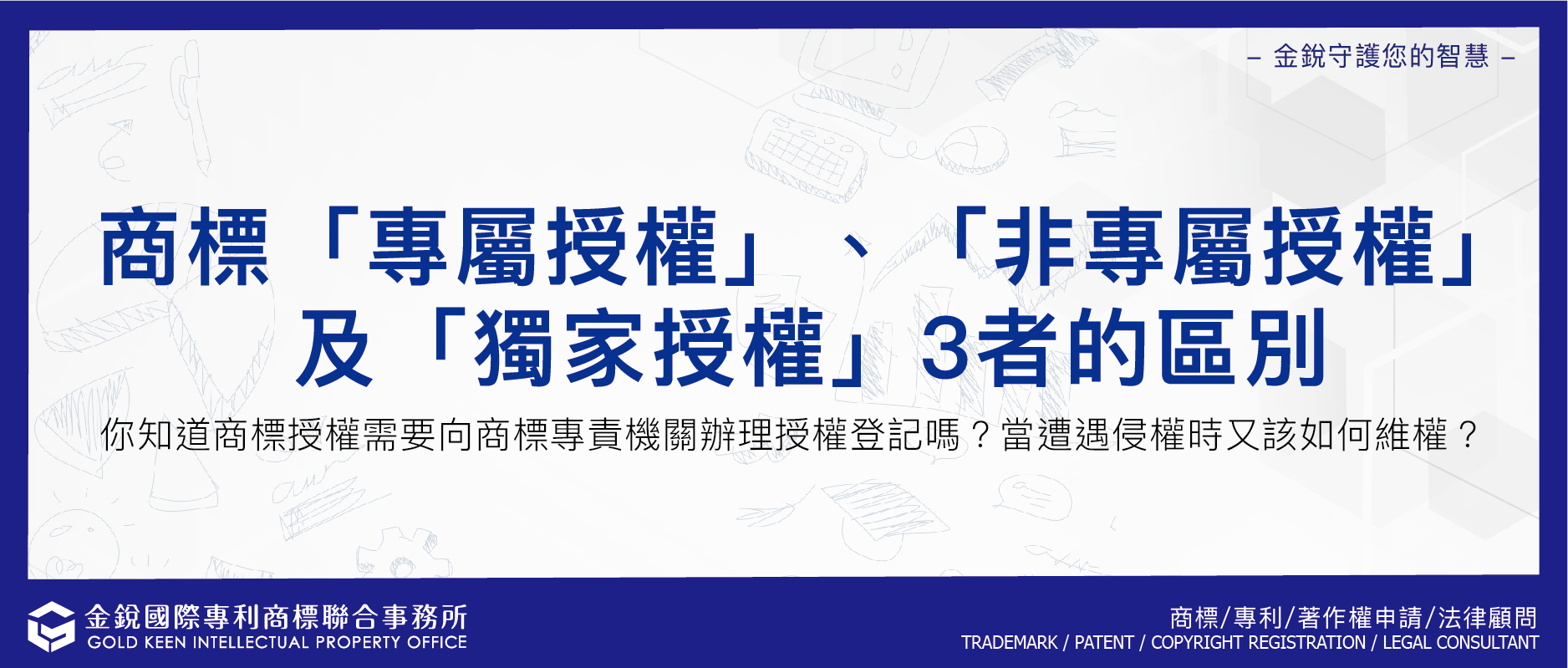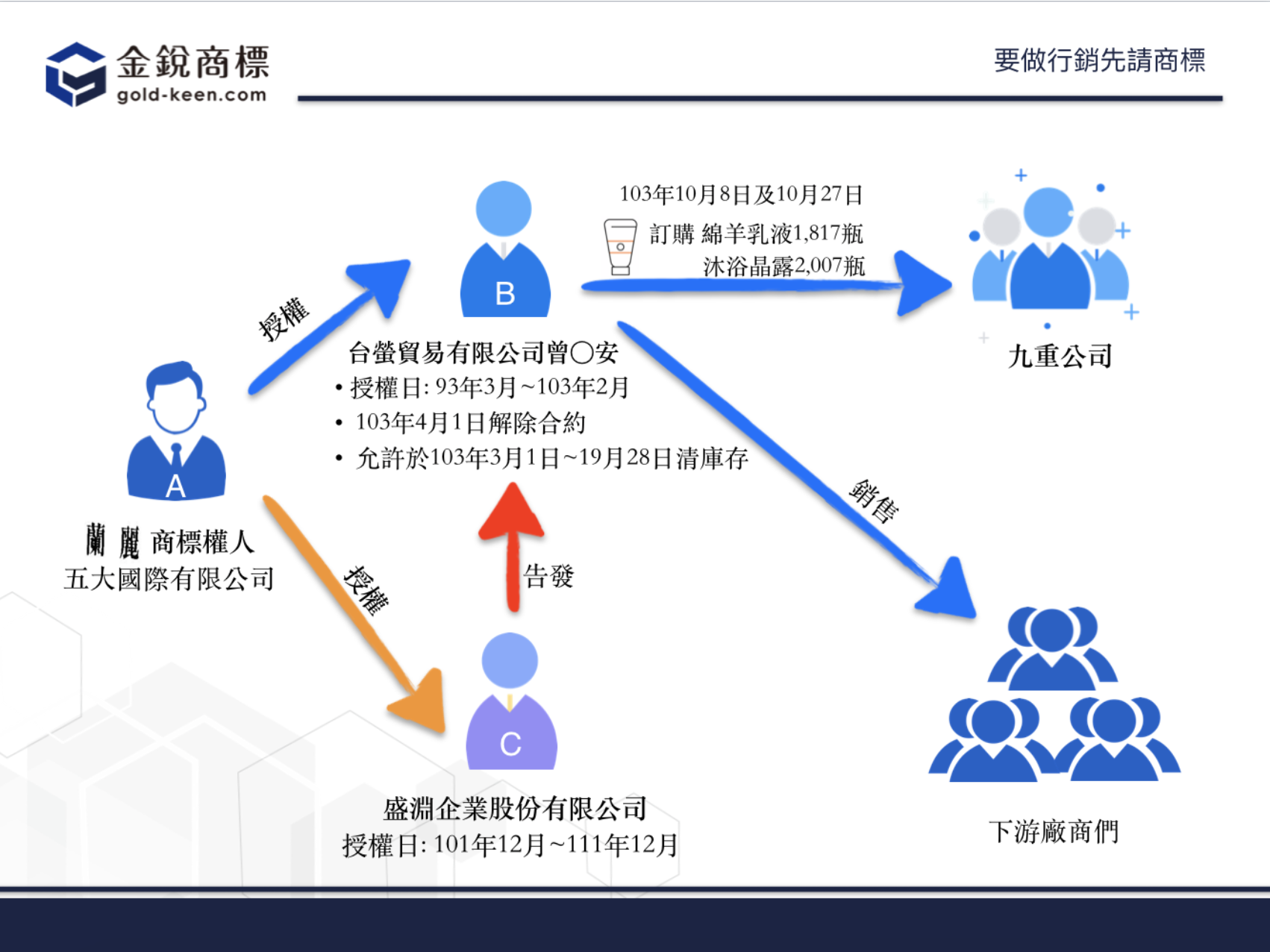|
Trademark Law article 39 1. A registered trademark may be licensed by the proprietor, exclusively or non-exclusively, for all or some of the designated goods or services for which it is registered and for a particular locality. 2. A license referred to in the preceding paragraph shall have no locus standi against any third party unless it is entered in the Register by the Registrar Office. 3. If the trademark right have been transferred after the license is entered in the Register, the transferee is still bound by the licensing contract. 4. If the entry of an exclusive license is requested by the proprietor of a registered trademark after a non-exclusive license is entered in the Register, such non-exclusive license shall not be affected. 5. An exclusive licensee is entitled, within the scope of the license, to exclude the proprietor and any third party from using the registered trademark. 6. Unless otherwise prescribed in a licensing contract, an exclusive licensee is entitled, within the scope of the license, to bring infringement proceedings in his/her own name. |

1. Exclusive license means: after being authorized to use, within the scope of the license, obtain complete exclusive right, to exclude the proprietor and any third party from using the registered trademark. Unless otherwise prescribed in a licensing contract, an exclusive licensee is entitled, within the scope of the license, to bring infringement proceedings in his/her own name. (Trademark Law article 39, paragraph 5 and 6)
→The right of an exclusive licensee
(1) Complete exclusive right
(2) To exclude the proprietor and any third party from using the registered trademark
(3) When trademark rights are infringed, an exclusive licensee is entitled to bring infringement proceedings in his/her own name
2. Non-exclusive means: after being authorized to use, within the scope of the license, the proprietor may continue to use the trademark and may authorize others to use the registered trademark. After being authorized to use, only within the authorized scope of the license.
→The right of an exclusive licensee
(1) After being authorized to use, only within the authorized scope of the license.
(2) Not exclude the proprietor and any third party from using the registered trademark.
(3) When trademark rights are infringed, an exclusive licensee isn’t entitled to bring infringement proceedings in his/her own name.
3. Sole license is a type of non-exclusive, means: after being authorized to use, within the scope of the license, to exclude any third party from using the registered trademark but not exclude proprietor. Only one sole licensee is allowed to use the trademark.
→The right of an exclusive license
(1) After being authorized to use, only within the authorized scope of the license.
(2) Not exclude the proprietor from using the registered trademark.
(3) To exclude any third party from using the registered trademark.
(4) When trademark rights are infringed, an exclusive licensee isn’t entitled to bring infringement proceedings in his/her own name.
(Refer to The IP Court Civil Ruling No. 7 in 2016, Taiwan Taichung District Court: an IP on the Incidental Civil Procedure Criminal Judgment No. 27 in 2017, Taiwan Taichung District Court: an IP on the Incidental Civil Procedure Criminal Judgment No. 2 in 2018)
Special reminder:
After being authorized to use, within the scope of the license, obtain complete exclusive right, to exclude the proprietor and any third party from using the registered trademark. If the proprietor still wants to use the trademark, he may ask the exclusive license to authorize him to use the trademark in the form of "non-exclusive ". This allows both parties to use the trademark.
Let's take a look at a trademark infringement case related to authorization

(Taichung District Court IP Complaint No. 3 Criminal Judgment in 2019)
It can be seen from the chart above: A first authorized B, and authorized C during the contract period. However, after the contract expired, B used the trademark without the consent of the proprietor A, and was informed by C
※ When faced with such situation that multiple authorization, could the trademark licensee C as a criminal complainant?
According to Trademark Law article 39, paragraph 6: only an exclusive licensee is entitled, within the scope of the license, to bring infringement proceedings in his/her own name.
After investigation, the proprietor A only gave the "sole license" of trademark to C, not an exclusive license in this case. Therefore, C wasn't the proprietor of the trademark in this case nor the trademark licensee of the registered trademark. C wasn't entitled to bring infringement proceedings in his/her own name. Because C wasn't directly harmed by the behavior of A. Therefore, C wasn't an informer. C should be the complainant in the lawsuit.
Finally, whatever it is an exclusive license or a non-exclusive license, the authorization registration should be handled with the trademark authority. Otherwise, once the trademark proprietor transfers the authorized trademark to others, the authorized licensee will not be bound by the original authorization contract, which will cause significant losses to the authorized licensee who has started marketing the trademark.
Trademarks are intangible property and cannot be delivered according to the Real Right of Movables. "Trademark Law" adopts "Registration Antagonism Principle". After the trademark authorization is authorized to be registered, the trademark authority will public the relevant information in trademark register or Trademark Official Gazette. After this announcement, the third parties can clearly know the rights and burdens of the registered trademark, and is bound by the registered matters. At the same time, the trademark proprietor or authorized licensee
may apply to the IPO for "authorized registration". If the application is made by an authorized licensee, an authorization contract signed or sealed by both parties must be attached. Or other documents that can prove the authorization.








